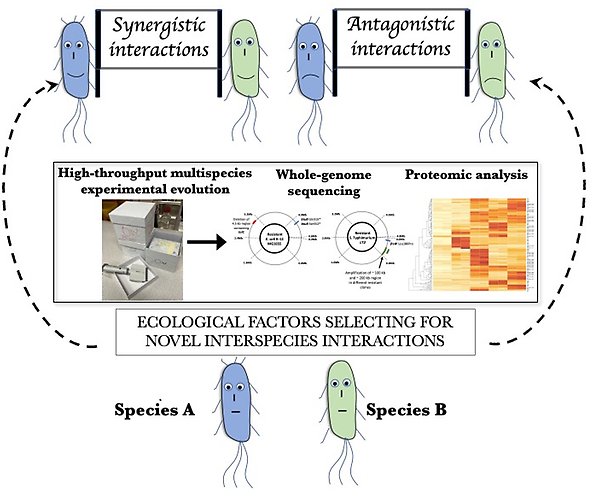Omar Mahmud Warsi research group

Antibiotic resistance evolution, and evolution of novel microbial interactions
Our research focuses on determining how interspecies interactions evolve over time, and how it, in turn, affects the adaptive diversity of the individual species involved. To do so, we employ an experimental evolution approach making use of several synthetic and tractable microbial multispecies systems. We are especially interested in investigating the changes in these multispecies systems over time using a combination of whole-genome sequencing and proteomic approaches, with an aim of gaining novel insights into the factors that dictate the evolution of interspecies interactions. The three main questions that our current research addresses are:
1. Role of ecological factors in the evolution of interspecies interactions
Ecological interactions are ubiquitous in nature and play an important role in dictating the ecological processes of a given community. Thus, a lot of the research over the last century has focused on increasing our understanding of these ecological interactions. However, the motivation behind these studies has often been to explain the characteristics of an existing ecological interaction. This has resulted in a large gap in our understanding of how novel ecological interactions emerge. Our group is thus focused on asking two specific questions in this regard 1) What ecological conditions result in species interacting with one another, and 2) What dictates whether these interactions turn out to be detrimental or beneficial?
2. Role of membrane vesicles in bacteria-bacteria and bacterial-host interactions
Membrane vesicles are spherical bilipid layered structures, 20-250 nm in size, that are released by all bacteria by blebbing out of the membrane and that can contain effector molecules. Although several studies have focused on the role of these membrane vesicles in pathogenicity, it is not clear if these vesicles play any ecologically relevant functions that directly affect the fitness of the bacteria. We are thus investigating how membrane vesicles isolated from different species of bacteria affect the fitness of the producing strain, with an aim of defining ecological conditions where selection for a change in properties of these membrane vesicles is an adaptive outcome.
3. Effect of perturbations on evolutionary dynamics of microbial multispecies systems
Ecological communities are affected by various forms of anthropogenic disturbances that can have long-lasting consequences on these communities. We make use of tractable microbial multispecies systems to investigate these consequences, and how these in turn influence the evolution of interspecies interactions. Currently, we are looking at how the dynamics of these multispecies systems are affected by perturbations caused by low levels of antibiotics, high temperatures and nutrient starvation. We aim to gain insights into the relationship between the genetic make-up of the bacterial species to its post-disturbance evolutionary dynamics.
